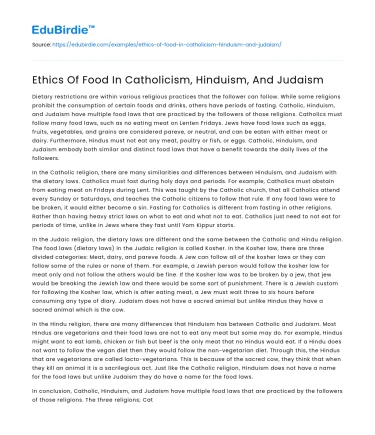Dietary restrictions are within various religious practices that the follower can follow. While some religions prohibit the consumption of certain foods and drinks, others have periods of fasting. Catholic, Hinduism, and Judaism have multiple food laws that are practiced by the followers of those religions. Catholics must follow many food laws, such as no eating meat on Lenten Fridays. Jews have food laws such as eggs, fruits, vegetables, and grains are considered pareve, or neutral, and can be eaten with either meat or dairy. Furthermore, Hindus must not eat any meat, poultry or fish, or eggs. Catholic, Hinduism, and Judaism embody both similar and distinct food laws that have a benefit towards the daily lives of the followers.
In the Catholic religion, there are many similarities and differences between Hinduism, and Judaism with the dietary laws. Catholics must fast during holy days and periods. For example, Catholics must abstain from eating meat on Fridays during Lent. This was taught by the Catholic church, that all Catholics attend every Sunday or Saturdays, and teaches the Catholic citizens to follow that rule. If any food laws were to be broken, it would either become a sin. Fasting for Catholics is different from fasting in other religions. Rather than having heavy strict laws on what to eat and what not to eat. Catholics just need to not eat for periods of time, unlike in Jews where they fast until Yom Kippur starts.
In the Judaic religion, the dietary laws are different and the same between the Catholic and Hindu religion. The food laws (dietary laws) in the Judaic religion is called Kosher. In the Kosher law, there are three divided categories: Meat, dairy, and pareve foods. A Jew can follow all of the kosher laws or they can follow some of the rules or none of them. For example, a Jewish person would follow the kosher law for meat only and not follow the others would be fine. If the Kosher law was to be broken by a jew, that jew would be breaking the Jewish law and there would be some sort of punishment. There is a Jewish custom for following the Kosher law, which is after eating meat, a Jew must wait three to six hours before consuming any type of diary. Judaism does not have a sacred animal but unlike Hindus they have a sacred animal which is the cow.
In the Hindu religion, there are many differences that Hinduism has between Catholic and Judaism. Most Hindus are vegetarians and their food laws are not to eat any meat but some may do. For example, Hindus might want to eat lamb, chicken or fish but beef is the only meat that no Hindus would eat. If a Hindu does not want to follow the vegan diet then they would follow the non-vegetarian diet. Through this, the Hindus that are vegetarians are called lacto-vegetarians. This is because of the sacred cow, they think that when they kill an animal it is a sacrilegious act. Just like the Catholic religion, Hinduism does not have a name for the food laws but unlike Judaism they do have a name for the food laws.
In conclusion, Catholic, Hinduism, and Judaism have multiple food laws that are practiced by the followers of those religions. The three religions; Catholic, Hinduism, and Judaism, have many similarities and differences in food laws which would be very beneficial towards the followers of each of those religions. The Catholic religion has many food laws such as not eating meat on Lenten Fridays. Judaism also has many food laws such as eggs, fruits, vegetables, and grains are considered to be part of the pareve, and it can be eaten with either meat or dairy. Finally, Hindus must not eat any type of meat, poultry or fish, or eggs.






 Stuck on your essay?
Stuck on your essay?

